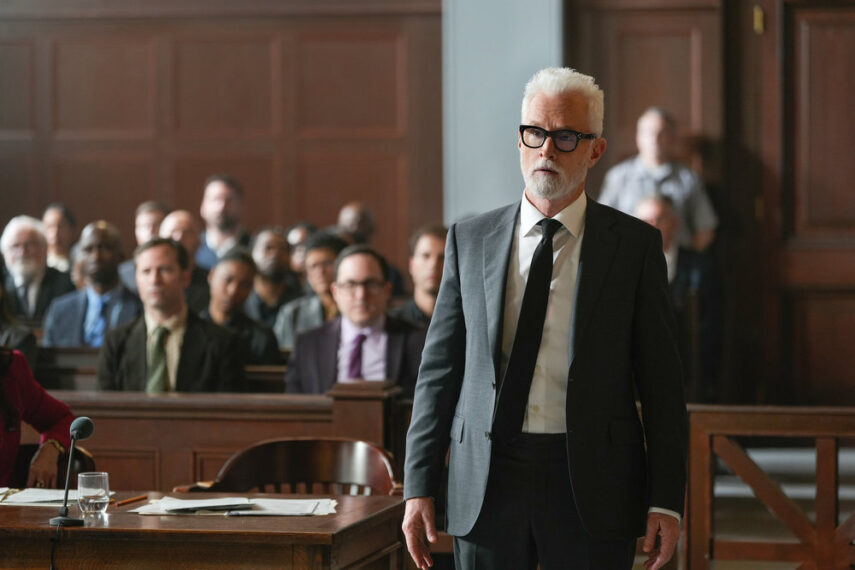[Warning: The following post contains MAJOR spoilers for The Rainmaker finale.]
Case closed! There were some big surprises in store in The Rainmaker‘s finale, even for those who might’ve read John Grisham‘s novel of the same name or watched the cinematic adaptation to know how the trial might end. To break down the biggest moments and find out the answer to some of our most burning questions, TV Insider caught up with the cast and creatives to dish on all the spoilers.
First, a brief recap of events. Melvin Pritcher (Dan Fogler), after talking to Rudy Baylor (Milo Callaghan), agreed to testify in the civil trial against the hospital. After all, he wasn’t going to get out of facing prison time for his crimes, no matter what, but at least this would give him an opportunity to get even with the people responsible for his own mother’s death in the house fire. In his testimony, which was allowed as a rebuttal witness account to the doctor’s cause of death assessment, he admitted to murdering multiple patients, including the son of Rudy’s client. Things went off the rails, though, when he leaped across the room to attack Leo Drummond (John Slattery).
Sarah Plankmore (Madison Iseman) was deeply upset by what happened — not because her client had actively concealed serial murders but because of the attack on Leo. She didn’t waver from her commitment to her client, even under pressure from Rudy, who ultimately admitted he was wrong about her.
At the same time, Brad Noonan (Wade Briggs) faced the very real consequences of doing Leo’s dirty work. After being cornered by the FBI, he then confronted Leo, who quickly surmised he was wearing a wire and refused to say anything that could incriminate himself. He’ll leave Brad holding that bag. Upon learning of this, Sarah approved of Leo’s move, saying, “Somebody’s blood has to end up on the floor, right?”
She also encouraged Wilfred Keeley (Hugh Quarshie) to testify, and he asked her to handle his cross-examination. During the direct, Rudy got Keeley to admit that he was the only person with access to the Narpans machine code to delete the records and that they were erased the day after he learned of Jackie Lemaczyk’s complaint about Pritcher. On cross, though, Sarah found a way to throw Brad under the bus for it, pointing out that he would’ve had access to the master codes as his attorney, too.
Christopher Barr / USA Network
With Bruiser (Lana Parrilla) now encouraging Rudy to rest the case, he had a different idea; he decided to call Leo on the stand. Though Rudy got in some good shots — chiefly, airing out his mantra that “the truth is not your client” — the biggest effect was that Leo then had to sit out the case and let Sarah finish the defense. She, of course, rose to the occasion and delivered a poignant and thoughtful closing argument to discredit the witnesses. However, when the jury verdict came in, Dot Black (Karen Bryson) prevailed with a massive, multi-million dollar verdict. Dot then pledged to use the money to create treatment centers, Rudy bought the bar he used to work out, and Deck (P.J. Byrne) decided to try his hand at the bar exam, again, this time with Rudy’s lucky coin in hand. Meanwhile, Brad went to prison and saw a familiar face in the crowd: Melvin Pritcher.
Below, the cast and creator dissect our most burning questions.
Did Dot get her full settlement money?
Yes. Whereas in the book and prior film adaptation, Dot’s settlement was merely an academic exercise, as Great Benefit simply closed up shop and never paid her (or her attorneys, by extension), in this iteration, she gets the money.
Creator Michael Seitzman explained the decision to change that part of the ending, telling TV Insider, “It’s one place where I differ with the book…. I mean, I love the book and I love John’s writing, but I felt at the end that I wanted there to be a real reward. I just felt like they’ve earned it. And I think especially in television, you’ve gone through 10 episodes with these people. You’ve watched this entire thing take place. You’re rooting with all your heart — if we did it right, that is, you’re rooting with all your heart — that they’re going to win at the end. I don’t want to take that away from the character. Then, I don’t want to take it away from the audience.”
Is Sarah fully committed to Leo’s dark side now?
Sarah might have had personal reasons for knowingly letting Brad take the fall for what Keeley did, but still, her morality was unquestionably compromised throughout the case. So is she just going to do Leo’s bidding or carve out her own way of lawyering in the future?
Madison Iseman guessed, “I would like to think she’s paving her own path and giving into her own ways. I even think there’s a world where she never had to give up Rudy, but unfortunately, with the circumstances, she’s always going to pick herself. And our whole story is about the morally gray, and I think she ends up making a decision that people will find questionable, but over everything, I do think she’s trying to think of herself and her own future. And that closing argument has become one of my party tricks because I will never forget it as long as I live. If I have one glass of wine, I’ll recite the whole thing.”

Christopher Barr / USA Network
Do Rudy and Sarah still have a future together?
It’s still possible, but those involved with the show have very different takes on it. For Milo Callaghan, what Sarah has done in this case and beyond hasn’t changed the way Rudy feels about her deep down: “I think he’s really in love [with her still]. I think it’s a love story at heart… Michael used to say it’s a bit like a bird and a fish who fell in love, but where are they going to live? That’s the height of their housing troubles. They’re trying to figure out, ‘Can we do this?’ We talked about future seasons and future thoughts and reconciliations, and for me, when I read the scripts, I wanted them to find a way back. I thought it was really smart to deprive the audiences of that, but at the same time, I don’t know, I think Rudy still feels the love. I think right to the last moment, he’s got his hand out.”
Iseman, meanwhile, thinks it’s less likely they can rekindle the romantic elements of their relationship, saying, “I don’t know. There’s a lot that happens. I think they love each other. I think they will always love each other. But I think they are so similar in the way that they are so hard-headed, and I think that’s what made them work so well in the beginning. But they might be too hard-headed to ever put the other person first. So I don’t know if they would ever have a healthy relationship. But you never know.”
Seitzman added, “She would have to make a big turn right for him to take her back because he loves the Sarah from Episode 1. The Sarah that she became is impossible for him to love, because even when Rudy makes mistakes, he’s not morally compromised. He is trying always to do the right thing. She knows that she’s making decisions that are the wrong thing. She’s asked numerous times if you want to get your hands dirty, how dirty? And then she does it over and over and over again. She’s given the opportunity… to take an off-ramp, but she doesn’t. Rudy doesn’t behave like that. His is a real coming of age story. Hers is a Faustian bargain. She would have to undo her deal with the devil in order for him to take her back. But I think, like all exes, you know, we all have a soft spot for every ex. We can’t help it.”

Christopher Barr / USA Network
Is Leo going to go to jail?
At the end of the finale, Leo revealed that, while Brad was already in cuffs, he was under his own FBI investigation. John Slattery, for one, has faith in his guy.
“I think Leo is going to do his damndest to stay out of jail, and he’s probably done it before,” he said. As for whether Leo has respect for Sarah in the end, after she proved to be a fellow cutthroat, he said, “Certainly. I think he’s respected her the whole way. I think he’s just trying to figure out whether she’s prepared to fight the good fight, as he sees it. But I think he respected her in the moment he met her, and that’s why he had her stick around.”
Is Bruiser happy her dad left?
After Bruiser found out the truth about her father, that he didn’t murder anyone, he still had to go on the lam from the FBI. So now, the firm is fully hers. Is Bruiser secretly happy about that, even if it means she can’t see her dad? According to Lara Parrilla, it’s “100%” yes. “She’s almost kind of relieved, but doesn’t ever say so, but then she’s secretly excited to do something different with the firm and give Rudy a chance because I don’t think her father would’ve ever done that,” she said.
Will Deck pass the bar exam?
P.J. Byrne isn’t so sure if his fast-talking associate counterpart will have what it takes to finally pass the bar, but he does have an idea of what might happen if he does. He told us, “I don’t know. Will Deck pass the bar after he’s failed it seven times in Season 2? I mean, is eight times a charm… I think he’ll do it, but I don’t think it’ll be easy. And I can only imagine him crossing the bar to his first case, he’s probably going to be a sweat pile. So he’s gotta eat some Lewis Barbecue to get his stomach full, and he might throw up.”
What is the significance of Rudy letting go of his coin?
Since we first met Rudy Baylor in Episode 1, his coin from a trip to Myrtle Beach with his brother has been his prized token, thought to give him luck and the memory of his lost brother. So it was a very meaningful moment indeed when he was finally willing to part with it and give it to Deck for luck with the bar.
“This has been both a driving force for him as well as an anchor that’s holding him down. It comes up periodically in these moments of stress. As he tells Kelly, at one point, ‘My brother said, if I rub my fingers over it’ll give me luck.’ She says, ‘Does it work?’ He says, ‘Sometimes.’ But it’s a security blanket, right? It’s somehow, ‘My brother’s wisdom is going to help me become the man that I want to become,’ the man that he felt his brother was. And by the end, we should believe, as he believes, that he’s become that man, and he doesn’t need it anymore. So he gets it to the person he’s closest with, which is Deck.”
Will there be a second season?
A second season has not yet been announced, but we’ve got some intel about what might happen if it does come along right here.
The Rainmaker, USA Network & Peacock
This story originally appeared on TV Insider

